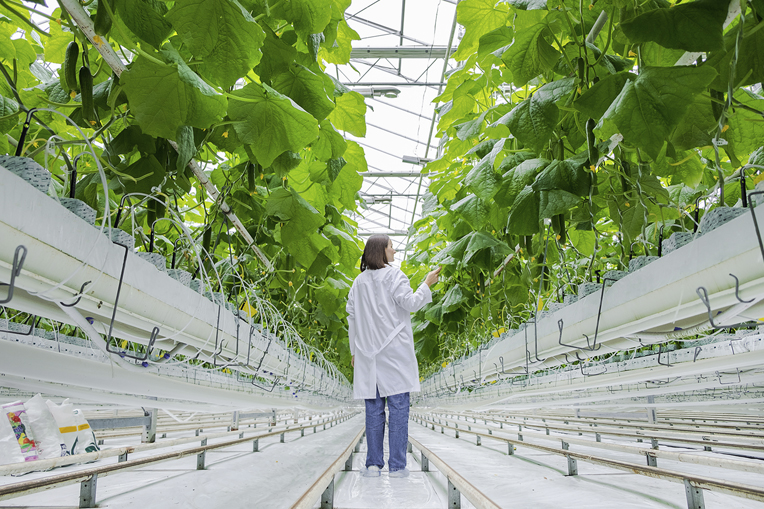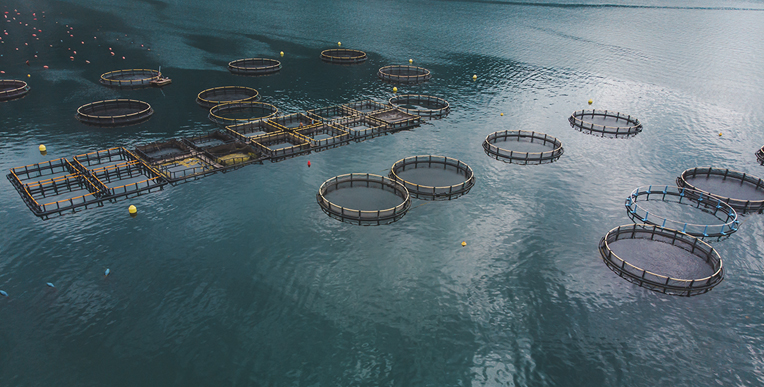
Singapore has made great strides in resilience and innovation around food security but there is much more on the horizon. As an island nation with less than 1 percent land resources designated for farming, the country is advancing both agriculture and aquaculture to weather the emerging changes in population growth, disease outbreaks, the geopolitical climate, as well as global warming.
The need to grow more with less, and grow local, helps to create a sustainable and secure Singapore in terms of food. Through innovation and collaboration the country aims to grow 30 percent of its own food by 2030 in the ‘30 By 30’ Goal set by the Singapore Food Agency (SFA).

Agriculture
With its sights set on becoming a leading agri-tech and food tech hub, collaborations with researchers, industry leaders, businesses and start-ups have been brought to the fore.
To stretch the ambition of the Singapore Food Story R&D Programme, an additional $165 million will be added to the programme, as announced by Deputy Prime Minister Heng Swee Kea.
To stretch the ambition of the Singapore Food Story R&D Programme, an additional $165 million will be added to the programme, as announced by Deputy Prime Minister Heng Swee Keat at the Singapore International Agri-food Week in October 2022. This brings the total invested to $300 million.
SFA highlighted that when the Singapore Food Story R&D Programme was first launched in 2019, $144 million was pumped into R&D in the areas of sustainable urban food production, future foods, and food safety science and innovation. Since then, 40 projects with the potential to transform food production and enhance food security have been given funding.
Singapore held the International Agri-Food Week in the last week of October 2022 with two new additions, The Global Agri-Food Scientific Symposium and The Agri-Food Tech Expo. Strong partnerships in the region as well as globally help to maintain diverse import sources for Singapore and to drive forward innovation in R&D.
An example of such a partnership is Temasek Life Sciences Laboratory. This agri-tech start-up brings together different expertise – Agritech expertise from Temasek, Nature-based solutions and carbon markets by GenZero, Climate tech by Breakthrough Energy Ventures and venture building by Wavemaker Impact. Their plans include work on decarbonising rice farming. Another partnership is The Food Tech Innovation Centre made up of A*STAR and Nurasa. They will be partnering with Swiss company Giavaudan whose collaboration on the Taste and Colour Lab at the Food Tech Innovation Centre are part of Singapore’s advances in work in future food.
Singapore has scarce land space on which to farm. Lim Chu Kang is such a space that will be undergoing a transformation into a high tech agri-food cluster. Last year, the government conducted engagement sessions with those ranging from farmers, educators, and nature groups. A sustainable agri-food zone in Lim Chu Kang was one of the main ideas proposed. There will be a multi-disciplinary team to develop the master plan for the area. Common facilities for agri-production, such as wastewater and waste management, distribution, and logistics, could be sited within Lim Chu Kang to be shared between farms. Circularity will be part of the planning framework, to encourage the by-products of farms to be used as inputs for other parts of the agri-food ecosystem.
Another option for land-scarce Singapore is climate controlled vertical farming. An example is GroGrace, a public-private partnership between Singapore and the Netherlands. Its multi-layer farm structure optimises limited space to grow more. GroGrace uses a dry hydroponics system, where plants are planted above the water. This results in stronger root development, a dryer micro-climate around the leaves, and stressless growth for the plants. This also enables the farm to grow a wide range of fresh produce all year round. By using Internet of Things automation systems and rainwater collection for irrigation and fertigation, it can potentially produce 33 tonnes of fresh, produce annually, within a 750 square metre compact facility.
To encourage innovation and sustainability, The Liveability Challenge is a global crowdsourcing platform that hopes to accelerate the launch of solutions to combat urban challenges in cities. The SFA and Temasek are co-presenting the Food Grand Challenge as part of the 2023 iteration of The Liveability Challenge. The Food Grand Challenge will focus on supporting disruptive circular urban agriculture and aquaculture solutions, as well as alternative protein innovations. The winners of The Liveability Challenge will receive a newly doubled prize of S$2 million in order to test its new technology and move towards commercialisation in Singapore.
As the Singapore Food Story develops, the importance of having a highly skilled agri-food workforce cannot be understanded. SFA collaborates with Institutes of Higher Learning and industry players to implement training programmes for students and adult learners to prepare them for an agri-food career.
In 2022, SFA partnered Workforce Singapore (WSG) and Republic Polytechnic (RP) to launch the Career Conversion Programme for the Agri-tech sector to equip mid-career professionals with the relevant knowledge and skills to join the industry as an Agri-tech Specialist or Agri-tech Operator.
Republic Polytechnic offers the Diploma in Environmental & Marine Science, which trains students to develop sustainable environmental and aquaculture solutions. Skills are focused in the areas of agriculture and aquaculture sciences, engineering, and info-comm technology.
From April 2023, the Institute of Technical Education (ITE) will offer a Work-Study Diploma in Agriculture & Aquaculture Technology. The Diploma will equip in-service employees and fresh graduates from ITE Nitec and Higher Nitec with engineering skills to operate high-tech agriculture and aquaculture systems.

Aquaculture
The aquaculture sector is a significant contributor to Singapore’s ’30 by 30’ goal with seafood being identified as an area of potential with it being a nutritious food that can be grown locally. The SFA has created the Aquaculture Plan with the vision to grow the aquaculture industry into a sustainable sector contributing to Singapore’s food security, and eventually becoming a leader in sustainable tropical aquaculture.
Aquaculture is being collaboratively developed with public/private, overseas, and local partners. Indeed, ‘AquaPolis’ is set to become a major part of Singapore’s Food Story 2.0. The AquaPolis programme brings together research institutes, Institutions of Higher Learning, farms, and companies to create sustainable aquaculture solutions. Some of these include SFA and research institutions such as Temasek Life Sciences Laboratory and National University of Singapore.
Mr Lim Kok Thai, Chief Executive Officer of SFA, was quoted as saying, “SFA welcomes this strategic collaboration. It is exciting to see R&D talents from local and overseas institutions as well as our key industry partners, coming together with innovation and sustainability in mind, to build our capabilities and capacity in aquaculture within Singapore and beyond. Our aquaculture industry plays a key role in our food security, and I am confident that these collective efforts will strengthen our food security and build a resilient food future for Singapore.”
Through the AquaPolis programme, scientists will develop solutions for real world aquaculture challenges, with the objective of addressing problems from farms. For example, researchers will look into developing superior fingerlings suited for tropical aquaculture with traits such as faster growth rates, and reduction in fish mortality from common fish diseases from the present 70 percent to 100 percent, to between 20 percent to 50 percent.
The nerve centre of the AquaPolis will be SFA’s Marine Aquaculture Centre (MAC) at St John’s Island. Through this initiative, it is expected that the cluster will collaborate actively with multiple Institutes of Higher Learning and Research Institutes. It augurs well that in November 2022, the SFA and Belgium-headquartered fish and shrimp nutrition provider INVE Aquaculture signed an agreement to jointly set up a hatchery technology centre at the Marine Aquaculture Centre.
In April 2023, Channel News Asia featured the story of Malcolm Ong and his company The Fish Farmer as one of seven farms that will be part of AquaPolis. He is interested in breeding red snapper. Since 2021, Ong has been working on the selective breeding of red snapper with the SFA’s Marine Aquaculture Centre at St John’s Island, James Cook University and Republic Polytechnic.
“What Malcolm wants is to have a snapper that can grow faster, have a higher survival rate and have better flesh quality, such as higher Omega-3 content,” said Dr Jiang Jun Hui, director of SFA’s aquaculture department, in the CNA report. “To do this, we will need to start selecting snappers that exhibit such traits.” Through the partnership, farmers will also receive training to help them build a consistent supply of quality fish fry.
The Aquapolis Programme hopes to bring together fruitful collaborations, as shown above, in order to develop Singapore’s aquaculture which will be important for the country’s food security.
Standardising and Recognition
Technology and post covid ‘new normal’ habits concerning access and food production was discussed at Food Tech held in January 2023, where food manufacturers and food business operators gathered to share information on food trends and food safety in Singapore. Ms Grace Fu, Minister for Sustainability and the Environment, launched the Singapore Standard (SS) 687 Guidelines for food e-commerce ensuring food safety throughout the different stages of the supply chain. Singapore is also working with the Codex Committee on food labelling to create international standardisation in food e-commerce.
Ms Grace Fu remarked, “With technology and the post-COVID “new normal,” the way we access and produce food is rapidly changing. We must continue to adapt to this changing environment, and the new guidelines for food e-commerce are a big step forward.
In March 2023, the SFA launched the Farm-to-Table (FTT) Recognition Programme to recognise food businesses in the Hotel, Restaurants and Catering (HoReCa) sector that support local produce. Developed in partnership with the Association of Catering Professionals Singapore (ACAPS), the Restaurant Association of Singapore (RAS) and the Singapore Hotel Association (SHA), the FTT Recognition Programme aims to encourage demand for local produce from both the HoReCa sector and consumers.
The programme consists of a FTT Recognition Programme Logo which acknowledges HoReCa businesses that adopt sustainable practices by procuring locally farmed produce. The logo is awarded to HoReCa businesses that procure at least 15 percent of their fresh produce ingredients in procurement value from local farms which produce hen shell eggs, leafy vegetables, beansprouts, or fish. This award recognises the importance of growing and eating local produce in an effort to reach the ’30 by 30’ target and acknowledges Hotel, Restaurant and Catering businesses that have taken the initiative to operate in this sustainable way.
Conclusion
Ms Grace Fu speaking at the Asia-Pacific Agri-Food Innovation Summit pointed out, “Achieving a secure and sustainable agri-food system in Asia will not happen overnight. It requires holistic planning, strong support, and deep collaboration from stakeholders including governments, farmers, and researchers.”
Indeed, through innovative research, collaboration, standardising and recognition Singapore’s food security, agriculture and aquaculture is set to thrive as the country reaches for its sustainability goals and ambitions in the coming years.